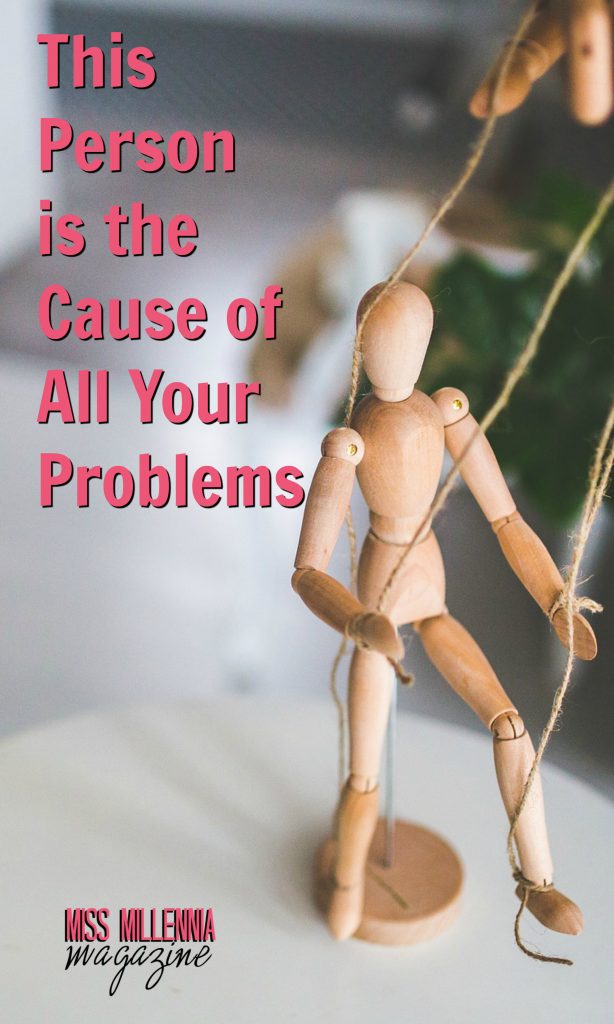This Person Is the Cause of All Your Problems
Take a breath: this is going to be a ride.
College is hard. Planning to transition into the world beyond higher education? Even harder. As a second semester senior preparing to make this enormous lifestyle change, I anticipate confusion, moments of disappointment, and probably tears along the way. Moving, staying, interviews, lost jobs, bank account—these are buzzwords that float through my head on a pretty regular basis. It seems like with each new consideration regarding my new life ahead comes a new terror I hadn’t thought of before.
But my biggest fear? Letting myself get in the way of all the exciting opportunities ahead.
I’m terrified of getting my heart broken—by dream jobs and dream people—and of committing to things about which I’m not one hundred percent passionate. I’m scared that I’ll make a wrong decision and blame myself for years to come. However, I’m trying to begin this “new life” by not blaming myself. How can you too externalize all your problems? Read on, friends.
Starting (or ending) With Externalization
“Starting” because I’ll bring it into the next chapter of my life, “ending” because I realize something so important at the very end of college. Here on the home stretch, I’ve made it a priority to stop blaming myself for certain situations. If I feel I’ve made a wrong personal decision, I’ll try to correct it. Nonetheless, I’ll acknowledge that there are external factors that make a situation what it is.
Thinking in this bigger-picture mode is not an easy task. Take time to write down your thoughts, and find at least three potential ways of fixing the problem at hand.
Take Opportunities
…so that you have no one to blame. If you hold yourself accountable for positive things, you’ll realize that you can initiate positive change in your own life. Banishing regret can be a #MajorKey to externalizing as well. Taking advantage of exciting—or just new—prospects can remind you that you are capable of not missing out.
Just as well, taking opportunities to rid your surroundings of toxic people, habits, and otherwise, can be equally gratifying. You have the ability to eliminate negatives just as you have the potential to increase the positives. Cut off that annoying relationship, throw out those malted milk balls you’ve had forever because you don’t like them, and now you’re cleaning out your fridge, and it’s time to LOSE WEIGHT, FINALLY. Throw out the milk balls, girl. Throw them far.
Differentiate Between Complaining and Problem-Solving

Whining is for people who don’t want to fix their problems. Problem-solving (or at least 80% problem-solving, 20% whining for catharsis) is for those who want to make a change. The issues don’t always come from within, but from needing a change of pace. To be complacent with the parts of your life about which you’re unhappy is to continue to be unhappy.
Try out being more positive (or rather, to stop being negative) for a period of time. See how you feel! You might find that you feel free of some weight. Sometimes when you complain consistently, you forget how to communicate without negativity. To read one person’s account of trying not to complain for a week (all your problems can’t be solved by complaining), check out an article here.
Acceptance and “Stuff.”
Former screenwriter and current psychotherapist, Dennis Palumbo, tells us that people, especially those with creative aspirations, have difficulty pushing all their “stuff” aside so that they can “get out of their own way.” This means that all of the things in life, all of the relationships and daily tasks, etc., are what keep you saying “I could do this project if (x) didn’t exist.” However, as Palumbo ultimately unveils, life is “nothing but stuff.” And this kind of mindset is the way people are actually saying, “I could do this if I were someone else.”
Palumbo says it best:
“From my perspective, a creative artist who invites all of who he or she is into the mix—who sits down to work engulfed in “stuff,” yet doesn’t give these thoughts and feelings a negative connotation; who in fact strives to accept and integrate whatever thoughts and feelings emerge—this artist has truly gotten out of his or her own way.”
Work on accepting all of your “stuff” as part of your life; don’t try to change the person that you are.
In the end, blaming yourself isn’t worth your time or energy. It depletes your spirit and motivation, so really thinking that you’re in your own way, is the very thing keeping you from achieving your personal goals.
Resources: Psychology Today, WebMD
**This article contains affiliate links, and we will be compensated for any purchase made by clicking on them. Thank you for supporting Miss Millennia Magazine!**






